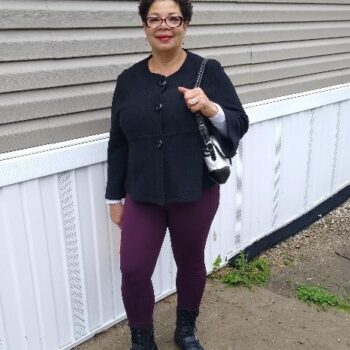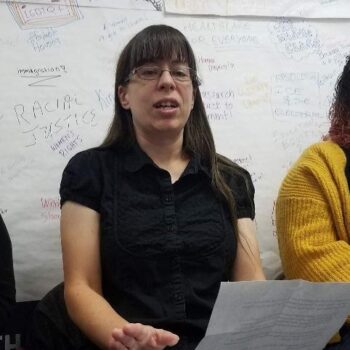The grassroots leaders of Manufactured Housing Action (MHAction) are taking on the corporate behemoths snatching up manufactured home communities for huge profit. They are fighting to save their communities and stay in their homes. But their organizing work goes beyond housing. MHAction leaders are building a robust, progressive movement that engages and mobilizes local leadership teams on a vast array of social, racial, and economic justice issues: just and fair immigration reform, caregiving awareness and support campaigns, and the Black Lives Matter movement. This article tells the story of MHAction’s work through the voices of leaders, staff, and elected allies.
Carol Johnson
I’m sixty years old. I live in Midwest Mobile Home Community in Independence, Missouri. I chose this community two years ago because I was looking for an affordable home where we could raise our granddaughter. The location is ideal — right next to the main highway and in a diverse school district. The community seemed decently cared for. They didn’t charge me big application fees. And they told me I could own my home after paying rent for six months.
That was all too good to be true. My community is owned by Impact Communities, one of the most notorious corporate landlords that buys up manufactured home communities and exploits low-income residents for huge profit. My neighbors’ lot rents have gone up five times since February 2019, from $375 to $530 per month.
In addition to milking residents for profits through higher fees, the landlord tries to push us out. Impact especially wants to get rid of long-term residents in older homes. When I first visited the community and said it looked nice, the manager said, “It’s going to be nice,” and she proceeded to point out the older homes that would be gone soon. I didn’t know what she meant. But now, those old homes are gone. I have no idea where those families have gone. I worry about them. Meanwhile, Impact has replaced their homes with newer models and is renting them for more.
I think they want to get rid of me because my lot rent is locked in through a lease that I signed with a separate company. If Impact gets rid of me, they’ll profit more. In May 2020, my family received two violations. When I complained, Impact sent us a notice saying they were terminating our lease and we had to be out at the end of August, in the middle of the pandemic. One of the violations was about a tire in our yard, which we took care of right away. The other was a noise complaint. They told me the police had been called and were dispatched to my property. But, when I called the police station, they said there was no record of that.
I think the complaints to Impact are coming from my neighbors, who are white and hold racist ideas about my African-American family. Impact is taking their word over ours. Their approach to management turns neighbors against each other, fueling racial tension and hatred. And that approach is going to push me out of my home and force me to lose all the money I paid toward it.
I organized a homeowners association to fight back against the false complaints about us and to bring our community together. Talking to residents has brought up ideas for real changes we want to see: a storm shelter, yard care, transparency from the landlord. But knocking on doors, I also see a lot of fear among residents. One of the residents— a lady living here for seven years— was afraid to even come out of her home. She was worried someone was watching. She didn’t want to be associated with me out of fear that she would lose her home.
But I’m not giving up. I’m going to keep organizing my neighbors, engaging our elected officials, and talking to the media. And I’ve joined MHAction to connect with the national movement of manufactured home residents fighting to protect their homes and communities.
Holly Hook
I’m a resident in Swartz Creek Estates in Michigan. I bought my manufactured home because I wanted a place that I knew I could afford. It was a great place to live for the first seven years that I lived here. The community was affordable for my neighbors, many of whom are seniors on fixed incomes. The community was well maintained.
No one knew that the ground under our feet was up for sale until a notice appeared on our doors in 2018 notifying us that Havenpark, a company I’d never heard of, was the new owner. Included in the letter was a $65 lot rent increase, due to start in thirty days and a vague mention of “improvements to the park.”
I needed answers as to why we were hit with this 22 percent increase. So I researched Havenpark. I only found a website for investors with large text that talked about “creating stable, long-term income.” I also found out they could charge as much lot rent as they wanted in Michigan because we don’t have rent control. Many of us own our homes, and it would cost thousands to move them. This leaves us trapped. Havenpark advertises this on their website: “Tenant turnover is minimal since it is difficult for tenants to move their homes. As a result, operating cashflow is among the highest of any real estate class.”
The rent increases kept on coming, along with new fees. In total, over the course of 13 months, our monthly payments rose by $124, or forty percent just for the ground beneath our homes and basic services. Every day, we fear another increase. A friend of mine in another Havenpark-owned community is about to lose her home because of the increases. She’s lived in her house, which she owns, since 1991. Now, she’s being priced out.
Even more outrageous, we learned that Havenpark bought our communities and many across the Midwest with financing through Bellwether Enterprise, a subsidiary of Enterprise Community Partners, and the loans are backed by Fannie Mae. We were alarmed to learn that Enterprise, a national affordable housing non-profit, would be part of a predatory scheme like this. Havenpark, Bellwether, and Enterprise have said they’re out to protect affordable housing, but my neighbors in my community and residents in other Havenpark Capital-owned communities are watching our affordable housing disappear.
That’s why we are banding together to fight — to demand fair treatment from Havenpark and to demand that the backers of these predatory landlords stop fueling the exploitation. With MHAction’s help, we’ve built a campaign driven by residents of Havenpark-owned communities in Michigan, Iowa, Montana, and North Dakota. We’re organizing our neighbors and have taken our demands directly to the Federal Housing Finance Agency, members of Congress, and Enterprise Community Partners. As our numbers grow and our voice gets louder, we’re confident they can’t ignore us and that we’ll stop Havenpark’s abuses and win protections for all manufactured homeowners and tenants being exploited by predatory landlords.
Kevin Borden and Liz Voigt
We hear heartbreaking stories from folks like Carol and Holly every single day. They are two of the two million manufactured home residents across the country who now pay their lot rent check to large investor owners of manufactured home communities. But they aren’t sitting idly by and taking it. They are leaders of MHAction’s movement striving to ensure that manufactured home parks are affordable and strengthening the progressive infrastructure in rural and exurban areas. We are blessed to support leaders like Carol and Holly as they build a national union of manufactured home community residents.
Manufactured home communities are affordable, with small environmental footprints, caring neighbors, and racial and ethnic diversity. They are home to seniors, immigrants, people with disabilities, low-income families, and people increasingly squeezed out of high-cost cities. Residents own or rent their homes but separately rent the land beneath them from a community landlord. Many residents chose their homes because of the community feel and affordable cost.
But, as Carol and Holly describe, large corporate investors, including some of the largest private equity companies in the world, are exploiting the ownership structure of manufactured home communities and the fact that residents cannot move their homes. They buy up communities, often a cluster in a region; increase rent, utility costs, and fees; and invest little in community maintenance and infrastructure. The investors celebrate consistent cash flows, while seniors and families face dire impacts. Low-income residents are left paying skyrocketing rents and fees at the expense of food or medicine, or abandon their homes.
For nine years, MHAction has built an online-to-offline organizing program to fight these predatory corporate owners and to build progressive power in rural and exurban areas and small cities. To reach manufactured home communities in low-density rural and exurban areas, MHAction uses geographically-targeted Facebook ads and Action Network emails. Once MHAction organizing staff and leaders engage residents through these online organizing strategies, they coach them to become organizers in their own communities and bring them into leadership teams that collaborate on corporate accountability and issue campaigns. Today, MHAction coaches multi-racial, multi-ethnic, women-led teams of residents in Iowa, Michigan, Illinois, Missouri, Montana, North Dakota, Utah, California, New York, Florida, and Delaware, with partnerships in Texas and New Hampshire. These leaders are organizing their neighbors, building coalitions with city-based tenants, and driving campaigns to demand reforms from predatory landlords and local, state, and federal officials to stop rent gouging, arbitrary evictions, inadequate community maintenance, and exploitative treatment.
We are up against an opponent with deep pockets — and the resources of the Wall Street investors gobbling up mobile communities for profits are only growing during COVID-19. But we have the resolve and we have the people. MHAction aims to expand our movement to reach all two million of the people paying rent to predatory landlords of manufactured home communities.
The most critical ingredient to achieving our goal is developing grassroots leaders who have the confidence, analysis, and campaign strategy to build power and win. MHAction’s dedication to leadership development is evident in the ways our leaders grabbed the attention of this year’s presidential candidates, including Elizabeth Warren and Kamala Harris. What it takes to build a leader-driven movement is best reflected in MHAction’s leadership convening spaces, where residents come together across geography, language, gender, race, and ethnicity. Whether in a conference room or on Zoom, leaders connect and break bread, debate and analyze injustices, give hugs when the pain pours out, envision a future rooted in love and justice, and plot a shared course to win.
Lindsay James
The morning after the 2016 election, I told my six-year-old daughter about our new president. Her eyes began to well up with tears and she asked me, “Mom, does this mean we have to build a wall?” This was the moment I realized I had to run for office to fight to bring down walls, not put them up, to break down barriers to affordable housing, mental health services, nutritious food, and good jobs with living wages. I work every day to live up to that promise.
I had served in the Iowa State House of Representatives, representing the 99th District, for only a few months when I started getting calls from manufactured home residents. I learned the stories of residents in the Impact-owned community in my district, who faced astronomical rent increases and illegal leases. More recently, Impact outrageously posted eviction notices on twenty homes in the middle of a global pandemic and in violation of a statewide eviction moratorium.
I learned the stories of residents in Havenpark-owned communities across the state, like JoJo Bailey in Waukee, who is 86 years old, has lived in her community 25 years, and faced a $200/month rent increase. JoJo shared, “I’m hardly making it with $600 a month going to rent, fees, and utilities, plus my car payments, food, and an old hospital bill that I’m still paying off after I fell and broke my hip at my job at Walmart. It’s rough. I don’t want to move and I don’t want to lose my neighbors. But if I can’t afford to be here, I’ll have to find something. Maybe I’ll find a roommate. Or pitch a tent.”
Senator Zach Wahls and I were outraged that the abusive actions by Impact and Havenpark weren’t adequately covered by Iowa law. We quickly got to work. We partnered with our colleagues on both sides of the aisle as well as MHAction, Iowa Legal Aid, Iowa Attorney General’s office, University of Iowa Labor Center, Teamsters, Center for Worker Justice of Eastern Iowa, and other local labor leaders. We developed a sensible bi-partisan bill to provide residents with basic protections against rent gouging, overcharges for utilities, no-cause eviction, and retaliation and to give residents an opportunity to purchase their communities. With residents building the case through media coverage, community tours with presidential candidates, and packed town hall meetings with state elected officials, we were in a good position to move forward basic resident protections. But at the final hour, the community owner industry association, of which Havenpark and Impact are members, killed our bill.
That is not the end of the story, however. MHAction leaders, along with residents and activists across Iowa, have built a campaign that has shined a light on the injustices manufactured home residents face. Their stories of hardship and collective action and their visibility on the national stage continue to show up in local papers and are rooted in our voters’ minds. We believe their work in the community and our work in the legislature have paved the way to make the corporate exploitation of manufactured home communities a critical issue in our upcoming elections.
As we make the case to voters this fall to end the Republicans’ hold on Iowa’s state government, we are excited to work in partnership with MHAction Votes!, MHAction’s c4 sister organization. Together, we will tell the stories of manufactured home residents and their fight against predatory landlords to engage Iowa voters around the corporate control of elected officials and the destructive impact the anti-government and hate-fueled agenda of the right wing has on our families and communities.
Grounded in our shared outrage at the injustice residents are facing and shared vision of affordable housing for all, I believe we will win.
Read the entire issue on Organizing in Rural America.





